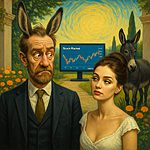? Mob Psychology: Rise Above for Financial Freedom ?
? Jan 19, 2025
When a crowd mutates into a mob, ☠️ reason dies a quiet death. In the coliseum of financial markets, where billions of dollars ? dance to the tune of collective emotion, understanding mob psychology isn’t just an advantage—it’s survival. ?➡️? Markets swing wildly, from euphoric highs to panic-driven collapses, proving a timeless truth: The greatest profits come from mastering the madness.
✅ History Repeats, the Players Change
? The GameStop insanity of 2021—a Reddit mob transformed a dying retailer into a $22.7 billion phenomenon.
? The crypto market’s chaos, where one Elon Musk tweet sent billions vanishing into digital ether.
? The AI-fueled bubbles, where hype outweighs reality—until the crash comes.
These aren’t random events—they’re textbook case studies in mob psychology ?, repeating throughout history, only at greater scale and velocity.
✅ The Great Minds Saw This Coming
? Gustave Le Bon—the father of crowd psychology—would instantly recognize today’s financial mobs in the same patterns that drove revolutions and manias.
? Carl Jung would see meme stocks as manifestations of the collective unconscious, trading on Robinhood instead of myths.
? Charles MacKay, who chronicled Tulip Mania and the South Sea Bubble, would shake his head at modern crypto hype cycles and say: “Told you so.”
? But here’s the harsh reality: The market mob isn’t some external force—we’re all part of it. Even the most logical investors ? can get swept up in the storm. The difference? Awareness.
? The Rothschild Principle: Profit From Panic
? “Buy when there’s blood in the streets.” – Baron Rothschild
? “Convert everything to your use.” – Michel de Montaigne
The key isn’t to resist the mob—it’s to profit from it.
✅ How the Smart Money Thinks
? Recognize patterns before the crowd does. The same emotional cycles repeat—fear, greed, FOMO, panic.
? Ignore the noise. 90% of market headlines are just psychological traps ?.
? Think like a predator, not prey. Retail panic = your entry. Retail euphoria = your exit.
The modern market isn’t just about numbers—it’s a psychological battlefield ⚔️. Social media amplifies hysteria. AI algorithms accelerate contagion. The question isn’t if the mob will lose control again—it’s when.
? Your Mission:
✔️ Learn to see through the chaos.
✔️ Exploit mass psychology instead of falling victim to it.
✔️ Become a calm strategist while others chase hype or flee in fear.
? The mob awaits your next move. Are you ready?
The Trump-Biden Election: A Case Study in Market Psychology
The 2020 U.S. presidential election provides a compelling example of how mob psychology can influence market behaviour. Many investors allowed their personal political biases to cloud their judgment leading up to the election, potentially missing out on profitable opportunities.
As legendary investor Warren Buffett famously quipped, “Be fearful when others are greedy, and greedy when others are fearful.” This advice encapsulates the essence of contrarian investing, which often contradicts the prevailing mob mentality.
During the election period, markets seemed to favour a Trump win based on trend analysis. However, savvy investors recognized that regardless of the outcome, opportunities would arise. The key was to focus on the underlying trends rather than getting caught up in the emotional fervour surrounding the election.
Here’s your revised and seamlessly integrated version, cutting out repetition while enhancing the impact:
? The Lemming Effect: How Mass Psychology Fuels Market Crashes ?
The Lemming Effect—where individuals blindly follow the crowd, disregarding logic and independent analysis—is the fuel that ignites market crashes. But paradoxically, for those who understand mob psychology, these crises present the greatest wealth-building opportunities.
? Fear-Driven Selloffs = Opportunity for the Aware
Nobel laureate Dr. Daniel Kahneman exposes the psychological trap at play: “The idea that the future is unpredictable is undermined every day by the ease with which the past is explained.” This delusion leads the herd to sell in terror at the worst possible moments—while the prepared contrarian steps in to profit.
? Crash Case Studies: When the Lemmings Ran Off the Cliff
✅ 2008 Financial Crisis: Panic selling plunged markets to extreme lows. Those who recognized the hysteria and bought quality stocks at bargain prices saw massive gains in the recovery.
✅ The Great Depression (1929): The market collapse led to economic devastation, but those who invested near the bottom reaped extraordinary rewards in the rebound.
✅ Panic of 1907: Financial turmoil triggered a severe crash, yet J.P. Morgan and a few bold investors stabilized the market, profiting immensely as it roared back.
The pattern is undeniable: Mass hysteria creates once-in-a-generation opportunities for those who can detach from the madness and act with precision.
? Mastering the Herd: Psychological Tactics for Investment Success ?
To exploit mass psychology, investors must combine emotional intelligence with technical precision.
? Recognize Emotional Extremes – The best trades emerge from fear-driven capitulation or euphoric irrationality—not from following the herd.
? Use the Trend, Don’t Fight It – A collapsing market doesn’t mean an instant bottom. Let panic exhaust itself, then strike. “The trend is your friend—until it ends.”
? Apply Technical Triggers – Indicators like MACD crossovers ? and RSI oversold levels ? can help identify true reversals—not just emotional knee-jerks.
? Maintain Discipline – While the mob reacts impulsively, the skilled investor moves with intent and precision—turning chaos into control.
? Track Your Psychological Biases – Keeping a trading journal ? isn’t just about numbers—it’s about spotting your own emotional triggers before they sabotage you.
? Contrarian Thinking: The Billionaire’s Edge ?
“The secret to investing is to figure out the value of something—and then pay a lot less.”
—Joel Greenblatt
Contrarian investing means standing against the deafening noise of the herd—but it’s more than just blind rebellion. The best contrarians don’t fight the market; they understand it so deeply that they anticipate the herd’s next irrational move before it happens.
? Sir John Templeton’s Market Psychology Framework:
✔️ Bull markets are born on pessimism – Buy when others are terrified.
✔️ They grow on skepticism – Hold while doubt remains.
✔️ They mature on optimism – Monitor for peak sentiment.
✔️ They die on euphoria – Sell when the last bear turns bullish.
? Social Media & AI: The New Catalysts of Mass Hysteria ??
In today’s markets, mob psychology is amplified at warp speed.
? Dr. Robert Shiller warns: “The news media are an essential part of the propagation of speculative bubbles.”
? Social media accelerates market contagion—one viral post can trigger billions in capital shifts overnight.
? AI-driven trading algorithms detect human emotion in headlines and act before the crowd even realizes it’s panicking.
? The modern investor must filter out misinformation, recognize emotional contagion, and understand how digital hysteria drives market moves.
? Become the Master, Not the Pawn ?
Markets will always be driven by fear, greed, and mass delusion—but that doesn’t mean you have to be a victim. Those who observe, analyze, and strike with discipline will continue to profit while the herd burns.
The question isn’t if the next emotional market swing will happen—it’s whether you’ll be ready when it does.
? Your move.
? Final Thoughts: The Mind is Your Greatest Asset
At Tactical Investor, we don’t just give you stock picks. We give you the mindset and tools to become a master of the markets.
✅ Dominate crowd psychology. ✅ Use technical analysis as your weapon. ✅ Strike before the masses wake up. ✅ Think long-term, act decisively.
? You can follow the crowd and remain average. Or you can understand the crowd and profit from them. The choice is yours.















